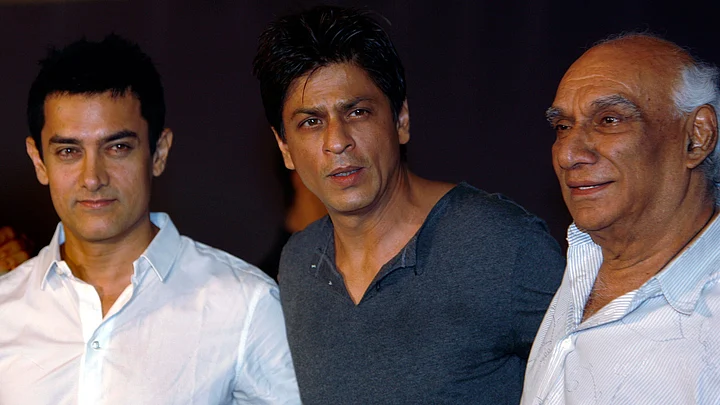It is four years since doyen of Indian cinema, Yash Chopra, passed away but even today whenever you watch a romantic film, you think about him.
He was a constant presence at the FICCI, at Guild, IMPAA and other important film events and no matter what the pressures, he was always smiling.
Those regular at YRF Studios were accustomed to watching him take his evening walk in the garden outside and even today when I visit the studio for a screening, I feel his presence. His actors were addicted to him and his outdoor shootings were such fun that they were often referred to as the honeymoon club.
He was the original badshah, some called him a magician because of the way he expanded his banner to include a distribution company, music division, advertisement section and finally an international film studio.
I’m privileged to have spent a lot of time with Yash Chopra, at his home, office, sets and studios. On his birthday, I recap fragmented conversations with the filmmaker at different stages of his career.
Q. The banner has been raining successes for a long time now, how does it feel?
Yash Chopra: I feel scared every single time my film is declared a success and I thank Almighty for his blessings. I often wonder if I deserve so much affection from him. I’m fortunate to be connected to a medium I enjoy. Cinema is my life and my passion irrespective of success or failure.
Q. What is the secret behind so many successes?
YC: I don’t think any such formula exists. I have just been honest and extremely hard working. My banner has never believed in setting up proposals. We made films because we sensed potential in them and the audience sensed our passion, perhaps that’s the only formula that worked.
Q. After so many years how does one remain objective about one’s work?
YC:
There is an art of watching a film but this art mysteriously deserts you when you are watching your own creation. I’m less attached to films but very sensitive to films I direct. All filmmakers, all over the world, feel the same way. But despite all the emotions running high, there is a method of checking that you are on the right track. Something, somewhere inside you always warns you when you are making a mistake.
Q. And what did the inner voice tell you when you were making Veer Zaara?
YC: The inner voice guides me on creativity, not commercial faring and during Veer Zaara I knew I had given my best shot and have no regrets.
Q. Looking back, did you expect Hum Tum or Dhoom to become such huge successes, what do you think clicked about them?
YC: None of us expected it, we had expected both would do average business. Hum Tum, a love story, was launching Saif Khan as a lead and Dhoom, an action film was a non-starrer that proved to be a game changer. That’s it, nobody can analyse success and if one could, there would be no failures.
Q. To what extent does your family get affected by your hits and flops?
YC: We are a small unit of five members and our anxieties and joys are linked to each other’s faring and future. It’s only natural to feel concerned.
Q. How do you divide your duties between you and your two sons?
YC: I concentrate on the distribution offices in India and abroad. The music company and the studio need more attention because they are still new firms. Aditya takes charge of the film productions - everything from the concept to the marketing and exhibition of every film. I remain the presenter of all films produced under the banner, his as well as mine.
Q. What happens in case of conflict?
YC:
Conflict is necessary for any growth but because we live in the same house we have ample opportunities to ventilate our thoughts. To be honest, I had not expected either Hum Tum or Dhoom to work commercially but Adi was so confident that I trusted his conviction.
Q. Would you say that the cinema has changed a lot in recent years?
YC: Today, I notice there is greater discipline on the sets and technology has proved a great facilitator. Whether it is costumes or auditions everyone is so focused. The younger generation does not leave anything to chance and their paper work is perfect. Every department has a blue copy of every schedule so there are no miscommunications on sets.
Q. What about the sync sound camera and screen monitors?
YC: Monitors were helpful but sync sound was difficult to accept initially. One is used to the sound of the camera compared to the chilling silence on the sets but it is all a mindset. Art director Sharmishtha Roy had never visited Lahore but created a perfect set for Veer Zaara, same with costume designer Manish Malhotra and scriptwriter Adi.
Q. While most of your contemporaries have packed up, you still enjoy the spotlight
YC: I don’t know... maybe it is because I don’t have any distractions from my work or it maybe that I don’t take my talent for granted. I’ve never thought about this.
Q. Also you have managed to bring together rival stars in your films, what’s the secret?
YC: As far as I know, the rivalry does not exist. If there are undercurrents, I’m not involved as long as it does not interfere in my film. I’ve worked with the best and the biggest in Daag with Sharmila-Raakhee, Silsila with Rekha-Jaya, Dil toh Pagal Hain with Madhuri- Karisma and Veer-Zaara with Rani-Preity and let me tell you, none of the stars have ever given me any reason for alarm.
(Bhawana Somaaya has been writing on cinema for 30 years and is the author of 12 books. Twitter: @bhawanasomaaya)
(At The Quint, we question everything. Play an active role in shaping our journalism by becoming a member today.)
